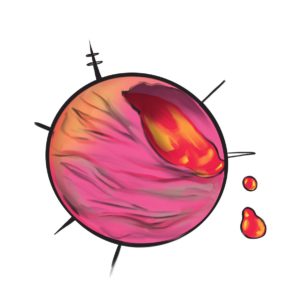“I love theatre because of its immediacy, because of its intensity, because of its capacity for things to go wrong. There’s just something about the adrenaline of throwing yourself into that situation that I love[…] I like the humanity of it all, I guess. I’m a really big fan of things that are really physical, and also really rough, and vulnerable, where mistakes can be made, and it’s just messy.”
Rhiannon Collett’s raw, human and intensely vulnerable plays have been breaking down barriers, resisting binaries, and providing uncomfortable jolts of reality for nearly five years. After living in Montreal and Toronto, and taking their work abroad, Collett has returned to Vancouver as their work — and life — enters a new phase. The stories and characters they have left scattered behind them are leaving a trail of possibility, refusal and creative resistance.
Collett describes themself as a coffee filter: taking the grounds from the lives of those around them, and filtering them into a blended brew. “Above all, my plays are just always about love,” they share. “And how hard it is to love people who let you down, and how hard it is to be someone who lets people you love down, and how we all make really complicated decisions sometimes to care for ourselves.”
Collett’s most recent work, WASP, has been an ongoing project for five years, and will soon be published by Playwrights Canada Press.
Like much of Collett’s work, the play engages with magical realism to create a world that is frightening and uncanny — featuring angels who invade a town in order to impregnate young adults on their 21st birthday.
“I’m never really interested in what the metaphor means,” Collett explains, “I’m more interested in how the metaphor feels. As a theatre creator, [I think about] how we create these alternative worlds, where wasps really do impregnate people, or teenage girls really can tear out a guy’s heart and throw it off a bridge. Where these weird moments, that seem really fantastical, actually do just exist.”
“I know that in my life, I’ve definitely had moments that seem too heightened to be real,” they continue, “and for me it allows me to connect with feelings that I would otherwise be unable to hold. Sometimes the limits of our reality are too small for what I want to talk about.”

Collett enjoys the collaborative process of creating theatre, particularly as their team works towards a final version of WASP. “Actors are really under-appreciated as artists, and they’re incredible artists. They’re incredible thinkers,” Collett enthuses, “I was just always so grateful for their offerings, their analyses and their questions, and this determination to chase down the truth of the play.”’
Collett describes a particularly empowering moment in which their co-workers Cole Alivs and Gabe Maharjan suggested an alternative ending to the play — one filled with hope and resistance. “It was a reminder of the traps that you create for yourself in your own narrative.” Collett reflects. “[Initially], no matter what this character did, it was always going to come back to this moment where they didn’t have anything left — they had to return to this forced heteronormativity. And then these two beautiful, beautiful people were like, “No. That doesn’t have to happen. They can just be gay.””
Working with gratitude in collaboration with the artists and creators behind each play, Collett’s goal is to create a working environment “where we’re all having fun, and we’re getting paid […] and we’re finding the truth of the story.”
Their biggest collaborative project is The Kissing Game, which was recently translated into French and filmed as part of Montreal-based Youththeatre’s 2021 season.

The play emerged from Collett’s own high school experience and relationships: “I was really interested in why teenage girls are so mean to each other […] I just remember the cruelty that I had exhibited, that my best friend had also exhibited, and I was just fascinated with this weird homoerotic undertone to it.”
Collett toured the show in 2016. They recall a particularly memorable rendition of the play in which they were performing in the middle of a gymnasium — surrounded by lockers, loud students and abrasive flash photography — to a small group of about twelve students.
“We finish the show and I’m like, “that was literally the worst show I have ever done,”” Collett remembers, “but then the lights come up and there are ten gay teenage girls sitting in the front row going, “YEAH, THAT WAS AWESOME!” Like, “We are so gay, and that was so cool.”
The high school gymnasium production ended up being the most gratifying and significant of the tour. The girls’ enthusiasm and gratitude offered Rhiannon and their team recognition of the importance and value of their work. No other audience responded with quite the same gusto, nor the same insight into why the play is so worthwhile, and so necessary.
“I never really had queer representation when I was a kid, growing up in North Van,” Collett explains. “I knew I was bisexual when I was about fifteen. I’ve always known I was queer, but I always shoved it down because I really needed the validation that came from having a boyfriend. I identify as lesbian now, so I wanted to write a lesbian play for teens because I never got that.”
Collett is encouraged by the work and energy of this generation of youth. “Youth are currently engaging in the conversations that we’re all having, but they’re having them faster because their brains move faster than anybody else’s. So conversations around race, sexuality and gender are just so much more at the forefront […] For me, I didn’t really radicalize, or become who I am now until I left town, met a bunch of queers and lived in Montreal.”
As WASP and The Kissing Game begin to take on a life of their own, Collett is able to pause and reflect on the past five whirlwind years of their career. “I feel more in control of my art,” they reflect, “I went to therapy and learned how to be an adult and learned how to support my feelings — without relying on fiction. I don’t think it makes my work less interesting, but it makes my work less terrifying […] My first couple plays I had to write because I felt like I was going to explode if I didn’t let them out, which I don’t feel anymore. It’s really nice.”

Collett’s newest work, Psychic Dirt, was commissioned by Nightswimming Theatre as part of their Five by Twenty Five series, which showcases plays about the climate crisis.
“I was interested in the idea of feeling dirty when performing erotic labour, and what that means,” Collett explains, “Then you take dirt, and you take soil, and start to unpack what that is.”
The resulting play is a criticism of capitalism: “It’s interesting that the bodies of sex workers are often the ones that [are associated with filth], when in actuality you’re dancing, or you’re working for oil execs or people in mining. What does it actually mean to be dirty?”
Collett uses sex work as the ground through which to explore notions of capitalism, labour, bodies and gender.
“I am really interested in sex work as an abolition of work,” they explain, “Because I think sex work is really radical in its proposal against capitalism. It takes something that anybody can do, a labour that people do all the time in their domestic relationships, and it positions it as a financially valued service. It transcends class. It transcends so many different things.”
They continue, “There’s something about the performance of gender, and how in sex work you’re performing a very specific idea of what a woman is, that I find extremely interesting. It’s very theatrical.”
Theatre, Collett notes, can never be fully or inherently anti-capitalist, because it exists in the same system of exploitation, underappreciation and consumerism that fuels so much oppression. “Until artists are well compensated and given humane hours, benefits and paid time off, theatre will never be revolutionary,” Collett expands. “The grind culture that the arts industry promotes is the same as any other exploitative industry – it exploits and undervalues those it claims to lift up.”
As Collett continues to throw themself into the intensity and immediacy of performance, they are inviting us to launch ourselves towards a reimagining of bodies, labour, community and relationships. Their terrifyingly honest works will validate the complexity of love, and remind us that it is the essential foundation of the alternative futures we are building.
WASP will be out in Spring 2022, and is available for pre-order at Playwrights Canada Press. You can explore Collett’s other works through their website at http://www.rhiannoncollett.com.


